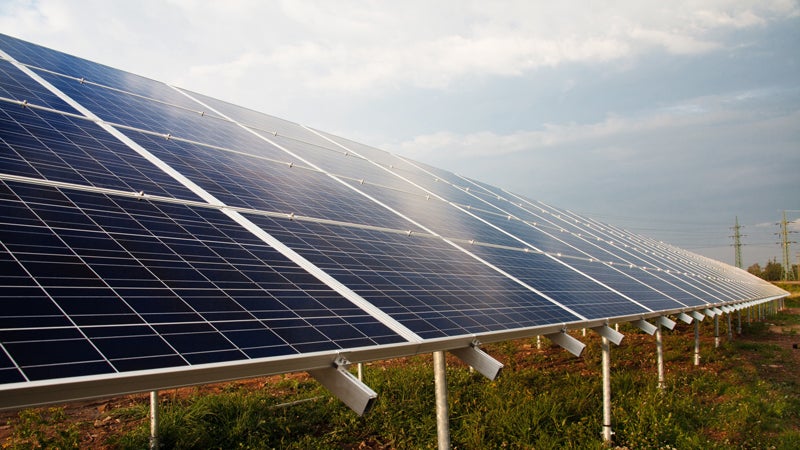Bill proposing to nullify local solar acreage caps postponed to 2025
Published 1:26 pm Monday, March 4, 2024

- Stock photo
Acreage caps Isle of Wight and Surry counties enacted last year to restrict the proliferation of solar farms can stay in place – for now.
A House of Delegates subcommittee voted on Feb. 27 to carry over to 2025 a bill that would have nullified locally-imposed bans and limits.
Sen. Schuyler VanValkenburg, D-Richmond, had sponsored Senate Bill 697, which would have mandated “any ground-mounted solar or energy storage facility” be permitted “as a special exception” provided the installation is in compliance with a locality’s “reasonable criteria and requirements for siting.” SB 697 passed the Senate in a 21-18 vote on Feb. 12 but stalled in the House during crossover, when each General Assembly chamber gets to vote on the other’s approved bills. The bill would have explicitly defined as unreasonable any “limits on the total amount, density, or size of solar and storage facilities that can be developed.”
VanValkenburg, during a floor speech ahead of the Feb. 27 vote, said his bill aimed to achieve benchmarks the General Assembly established four years ago with the passage of the Virginia Clean Economy Act, which mandates Dominion Energy transition to 100% carbon-free energy sources by 2045. The 2020 law requires at least 16,100 megawatts, or just under two-thirds of the state’s electricity, come from solar or offshore wind farms by the end of 2035. A 2022 survey by the University of Virginia’s Weldon Cooper Center identified 51 operational utility-scale solar facilities across the state generating a cumulative 2,657 megawatts.
VanValkenburg described his bill as an attempt to “thread the needle” between “property rights, local government authority and our energy needs.”
“It changes the terms of the conversation at the local level because rather than the conversation being about banning or not banning the conversation becomes about each individual project and the merits of the project which is where the property rights piece really comes in,” VanValkenburg said. “There’s people who have property that want to use their property for solar projects and right now there’s no process to go through in some localities.”
Isle of Wight, which has approved nine solar farms since 2015, amended its zoning ordinance in 2023 to cap the cumulative acreage devoted to solar at 2% of the county’s prime farmland, or 2,446 acres. Surry, which has approved three solar farms to date, last year added language to its comprehensive plan capping solar and other energy projects at 10% of the county’s developable land, or 15,278 acres.
Isle of Wight’s nine approved solar farms, two of which are operational, collectively account for 2,226 prime farmland acres or 91% of the stated maximum. Surry’s three account for just over 5,000 acres or just under 34%.
VanValkenburg’s bill would have allowed caps on the number or acreage of solar farms only if the total area devoted to solar exceeds 4% of a locality’s total square mileage, or 8,082 acres in Isle of Wight’s case and 7,141 acres in Surry’s.
Opponents of SB 697, which include the Virginia Association of Counties, known as VACo, say the bill usurps local authority to regulate land use. Isle of Wight and Surry are each members. Eleven speakers spoke in opposition to VanValkenburg’s bill at the Feb. 27 subcommittee meeting, while another four spoke in favor.
Joe Lerch, director of local government policy for VACo, argued localities were already stepping up to meet demands for clean energy.
“We don’t feel that this bill is necessary and it messes with the local process,” Lerch said.
Proponents of the bill, which included Victoria Higgins of the Chesapeake Climate Action Network, argued local-level rejections of solar farms only further Virginia’s dependence on fossil fuels.
“When we say ‘no’ to clean energy, we are tacitly saying yes to fossil fuels, to climate change, to the environmental destruction, the health impacts, the health disparities and the catastrophic long term economic consequences that come with them,” Higgins said.
Del. Candi Mundon King, D-Dumfries, proposed tabling the matter to next year in hopes of addressing what she called “unintended consequences for localities,” and was joined by the subcommittee’s five other Democrats and its four Republicans, making the vote unanimous.
Neither Isle of Wight’s nor Surry’s caps constitute an outright moratorium, according to county officials.
Isle of Wight Assistant County Administrator Don Robertson describes the 2% cap as “ part of the criteria” the county’s Board of Supervisors will use when evaluating solar farm applications. It “does not prevent applicants from applying, nor does it prevent the Board from considering approval of a project that exceeds the current 2% cap,” he said.
Surry County Attorney Lola Perkins advised Surry’s supervisors last year that it would be “very difficult” to impose an outright moratorium since state law allows for the development of solar farms.
Two other solar-related General Assembly bills, one in the House and one in the Senate, were previously tabled to 2025. HB 636, which would have created an approval process overseen by the SCC rather than local governing bodies for projects capable of generating 50 or more megawatts and its companion Senate bill, SB 567, each stalled in their assigned subcommittees on Feb. 6 and 9, respectively.
Editor’s note: This story was updated at 5:50 p.m. on March 4 to correct the number of operational solar farms in Isle of Wight County.





